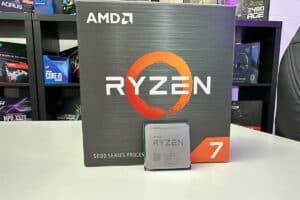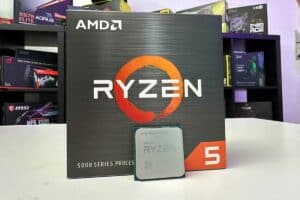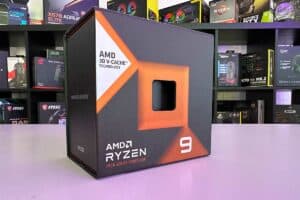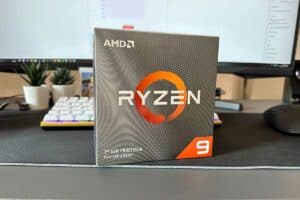Intel core i5-13600K review – is the 13600K worth it?
Intel’s 13th generation of CPUs is finally here, but do they live up to all the hype?
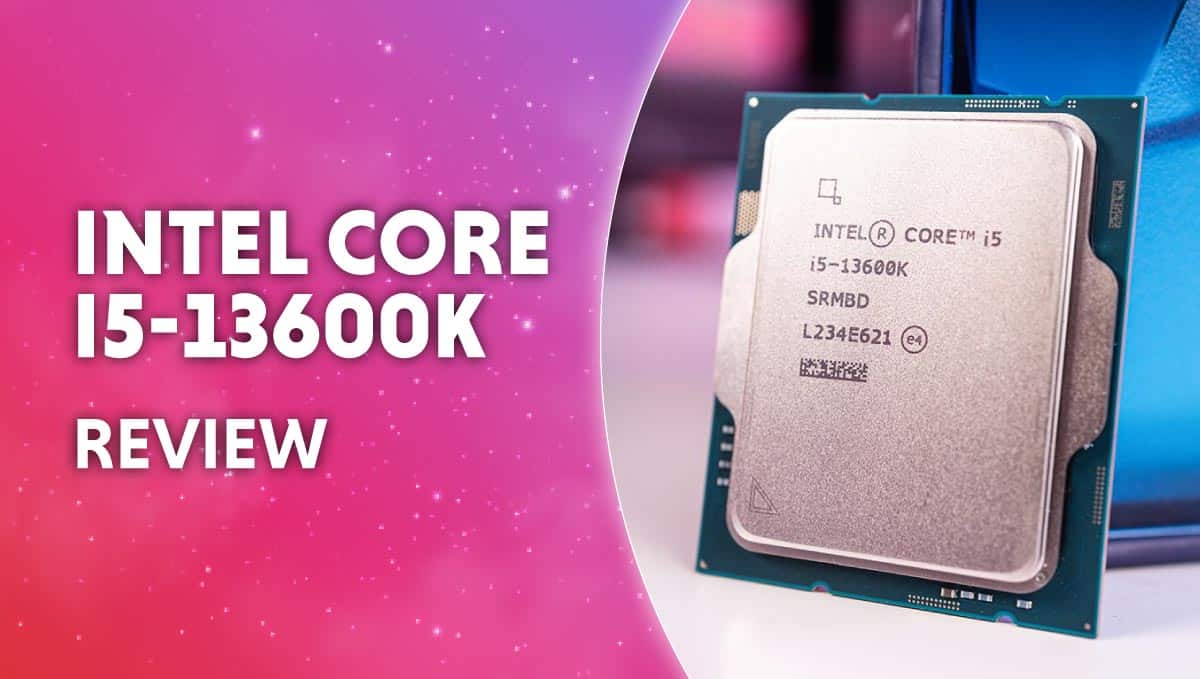
WePC is reader-supported. When you buy through links on our site, we may earn an affiliate commission. Prices subject to change. Learn more
Intel officially released its 13th generation Raptor Lake CPUs on the 20th of October 2022. There has been a lot of hype around Intel’s new CPUs and whether or not they’re going to outperform team red’s latest offerings.
Now read: 13600K where to buy.
Today we will explore the performance, price, specifications, and more around the 13600K. We’re going to uncover all there is to know about the i5-13600K. Will it be with the asking price? Will it beat AMD’s equivalent? Let’s find out.
Under the microscope today is the i5-13600K if you didn’t already know. This CPU is the bottom end of the Intel 13th generation CPU line-up. But don’t let that fool you, it’s by no means a slouch.

Intel Core i5-13600K
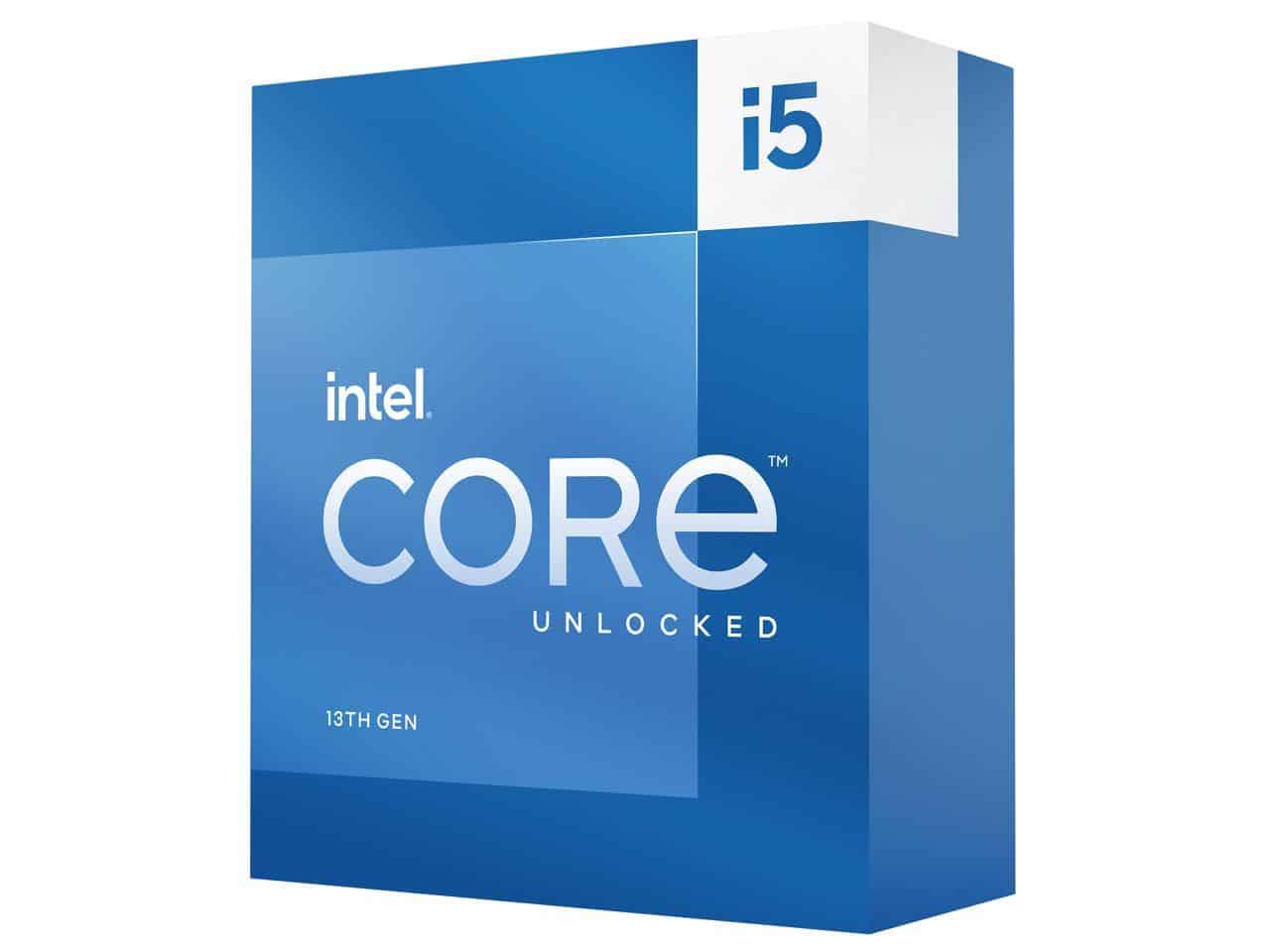
Cores
14
Threads
20
Base speed
P-cores 3.5 GHz / E-cores 2.6 GHz
Boost speed
P-cores 5.1 GHz / E-cores 3.9 GHz
Cache
20MB
TDP
125 W / 181 W boost.
Core i5-13600K specifications
The 13600K is the bottom end of the 13th-generation Intel CPUs. This isn’t a testament to its performance, however, it just happens to be the least powerful CPU in the line-up. The 13600K still contains much power.
The specifications of the i5-13600K are as follows:
- Cores: P-cores 6 / E-cores 8
- Threads: 20
- Base clock frequency: P-cores 3.5 GHz / E-cores 2.6 GHz
- Boost clock frequency: P-cores 5.1 GHz / E-cores 3.9 GHz
- L3 cache: 20MB
- Default TDP: 125 W / 181 W boost.
- iGPU: Intel UHD graphics 770
Intel i5-13600K what’s new?
Many things have been left the same as Alder Lake inside the 13th-generation CPUs, but there are a couple of things that are new.
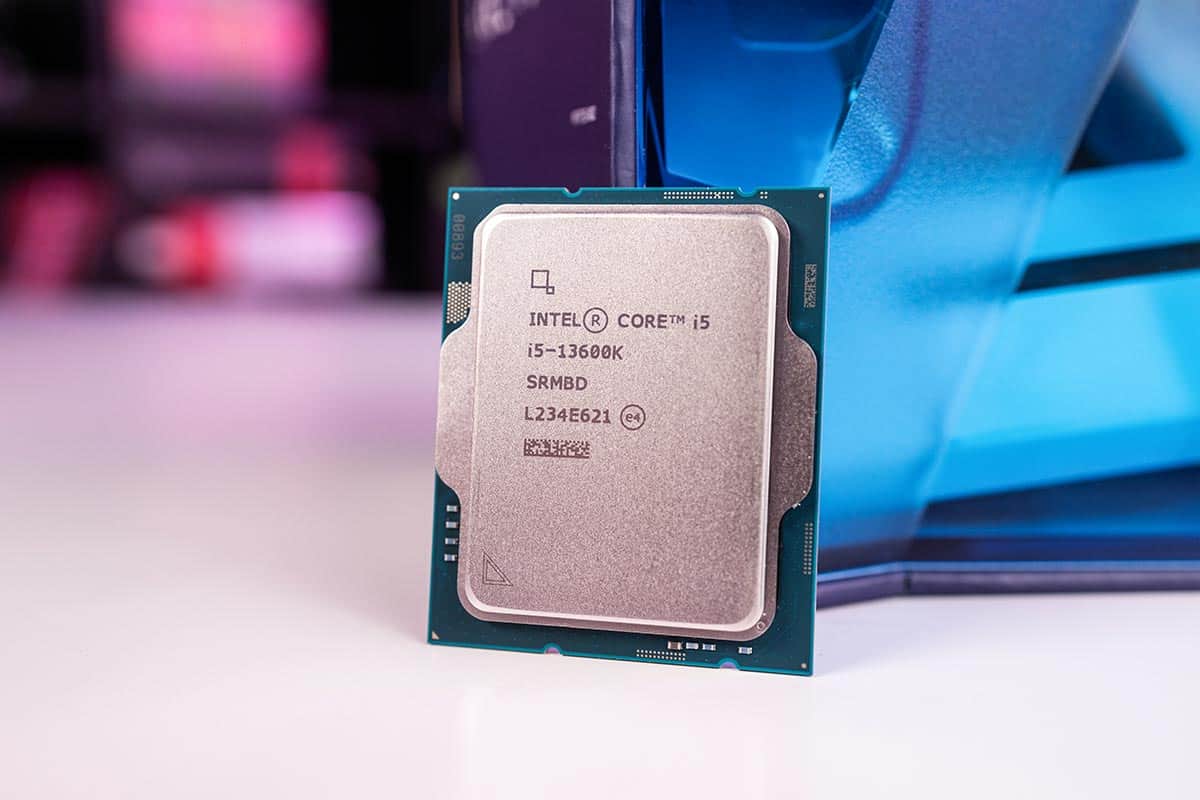
Intel has opted to re-design the cores in the 13th gen CPUs, naming them “Raptor Cove” allowing for improved speed paths of up to 600MHz over Alder Lake cores.
The 13th gen Raptor Lake CPUs are designed on the same Intel 7 manufacturing process as Alder Lake, but this time they feature an upgraded 3rd gen SuperFin transistor capable of way better channel mobility.
Finally, we have the larger L2 cache, now Intel has assigned 2MB of L2 cache per core supported by the new dynamic prefecture algorithm, dubbed “L2P”
The TDP has seen a massive increase up to 253W in some cases, meaning you’ll need a pretty beefy cooler to keep the 13600K cool. You’re given more of an easy time trying to cool the 13600K, however, as it only has a TDP of 181W when it boosts.
Besides that and some improved DDR5 memory speed compatibilities, not much has changed. We’re even on the same iGPU as the last generation (UHD 770).
Intel Core i5-13600K performance
We tested the i5-13600K on a test bench comprised of only the latest and greatest hardware. Our test bench was comprised of the following components:
- Intel Core i5-13600K
- ASUS ROG RYUJIN ii 360 CPU cooler
- ASUS ROG Maximus Z790 Extreme
- Corsair Vengeance 16GB DDR5 @5600Mhz
- MSI Gaming X Trio RTX 3080
- Fractal Design ION+ 860W
- Samsung 860 Evo
For the vast majority of this test, we will be comparing the 13600K to the 7600X from AMD. as it’s supposed to be team red’s counterpart. Let’s see how the two CPU stack up against one another.
Intel Core i5-13600K synthetic benchmarks
Here we ran the 13600K through all the synthetic fan favorite benchmarks, such as CPU Z, Cinebench R23, and Geekbench 5. Reporting on both single and multi-core performance.
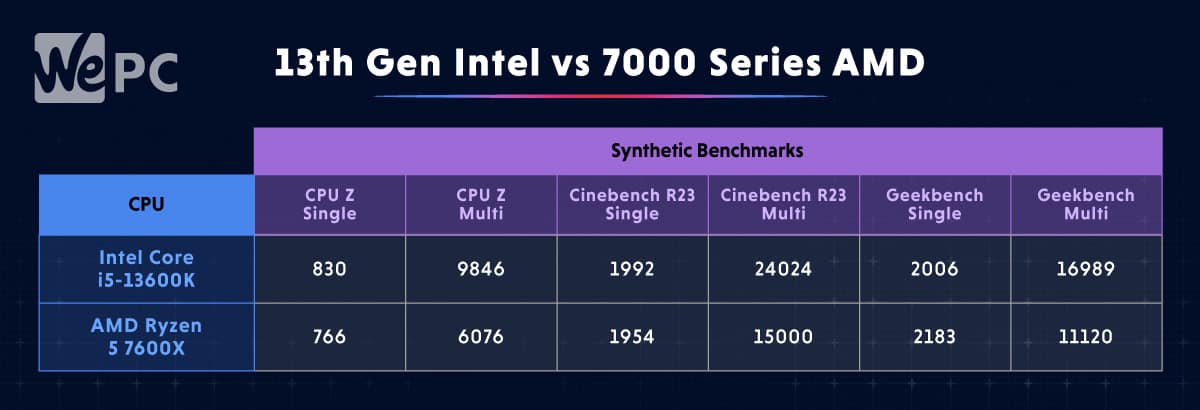
CPU-Z
First off, in CPU-Z the 13600K did fairly well for a processor at this price point, scoring 830 points in the single-core benchmarks, and 9,846 points in the multi-core benchmarks. Comparing this to the 7600X’s results, we can see team red fall behind, with scores of 766 points and 6,075 points respectively.
Cinebench R23
In Cinebench R23, we see a much closer single-core performance. The 13900K scored a very respectable 1,992 points in the single-core portion of the benchmarks, and 24,024 points in the multi-core benchmark. This is compared to the 7600X’s 1,954 and 15,000 points respectively.
Geekbench 5 benchmarks
In Geekbench, we saw the 7600X perform better in the single-core benchmarks once again (the same happened in the 13900K review against the 7900X) Confirming the Zen 4 cores’ proficiency in AI and decoding workloads.
The 13600K scored 2,006 points in the single-core benchmarks, and 16,989 points in the multi-core benchmarks. Compared to the 7600X’s 2,183 and 11,120 points respectively.
Intel Core i5-13600K real-world gaming benchmarks
We put the i5-13600K through its paces in real-world gaming workloads as well as synthetic benchmarks. Here are five popular games we opted to test the 13600K in.
We are again comparing the 13600K’s performance to that of the 7600X similar to the synthetic portion of this article.
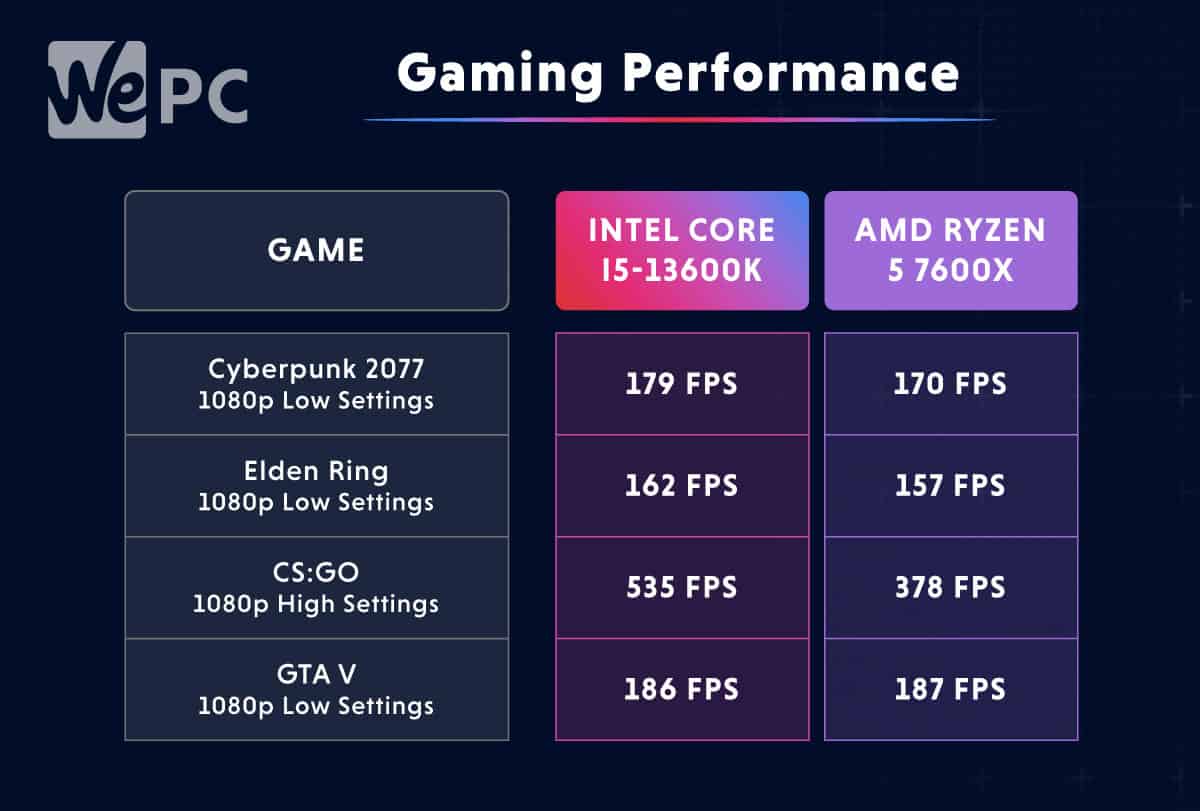
These are the games we tested and the results we found while benchmarking. All of the games are tested in 1080p and on low settings, except for CS:GO which is set on high.
Intel Core i5-13600K gaming benchmarks
First up is Cyberpunk 2077, the 13600K manages an average FPS of 179 FPS while the 7600X trails just behind, with an average FPS of 170 FPS. This is where the single-core proficiency of the 13600K will begin to shine.
Elden Ring tells a similar tale, with the 13600K scoring a 162 FPS average, meanwhile the 7600X trails slightly behind with an FPS average of 157 FPS.
CS:GO brings us a little surprise, in the form of the 7600X out-performing the 13600K. The 13600K comes in with an average FPS of 353 FPS, whilst the 7600X scored an average of 378 FPS.
GTA V as always never tells us anything definitive, we see both CPUs performing the same at around a 157 FPS average. We’re definitely limited in GPU power here on GTA V, despite being on low settings
Intel Core i5-13600K performance overview
The i5-13600K is a phenomenal CPU with a lot to prove, the CPU dominates in single-threaded workloads in all but one synthetic test where the Ryzen CPU was really playing to its strengths.

The 13900K dominates in multi-core workloads, thanks to its extra cores and threads. At the end of the day, if you smack more cores and threads into a CPU than expected, it’s probably going to do better than the limited competition. But as we see in the core-to-core comparison, the single-core performance is better in the 13600K.
projected performance of the 13th-generation CPUs was around 15% more single-core performance and 41% better multi-core performance, and it’s safe to say that intel has hit its mark.

In gaming, the 13600K is pretty tame again the 7600X, only offering uplifts in two games, however, the uplifts are pretty significant. This again is all thanks to the 13600K’s higher clock speeds as well as its increased L2 cache.
Intel Core i5-13600K iGPU performance
Here we have the iGPU performance of the 13600K, it’s important to note that this is exactly the same iGPU that resides within the 13900K and all of the Alder Lake CPUs.
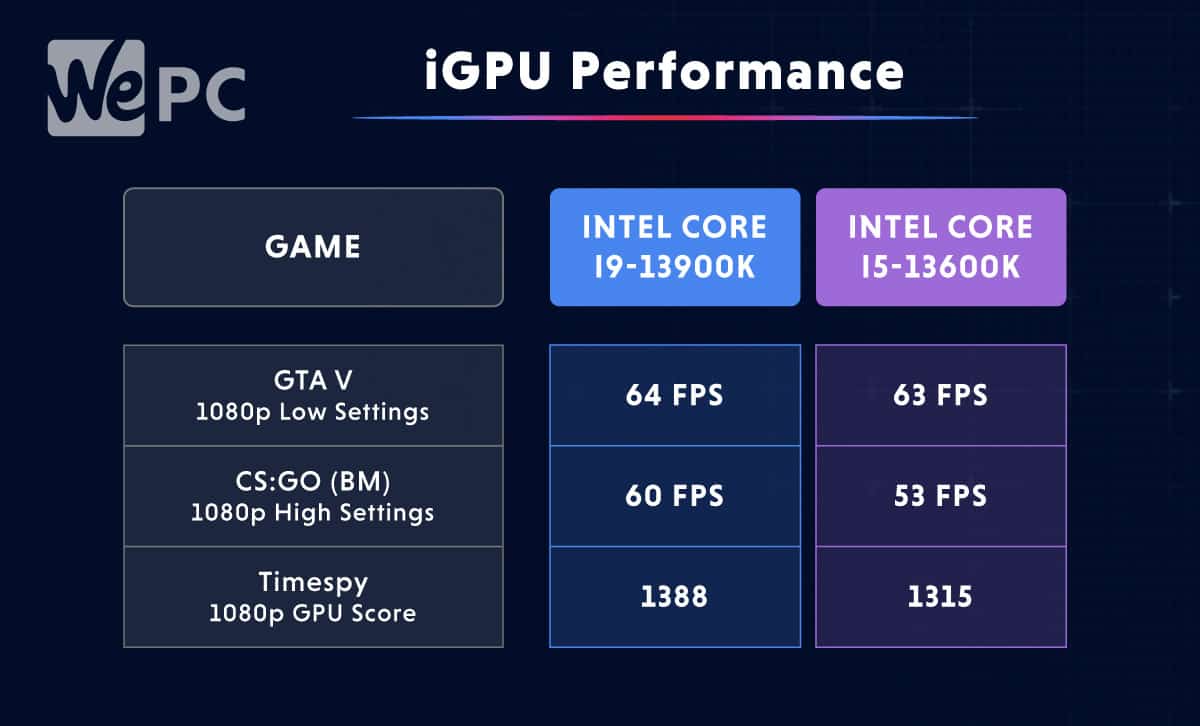
First off, we tested the Intel UHD 770 iGPU in 3DMARK’s Time Spy, which resulted in a score of 1,315 points. Not terrible but the 13900K did manage to pump out a little more, with a score of 1,388 points.
Next, we tested the 13600K in GTA V, which revealed the same results as the first test in GTA V, we’re GPU bound. There was only one FPS between the 13600K and the 13900K in this test.
We did see some differences in the CS:GO benchmark, however, we used the benchmark workshop map to keep things consistent across the board. We saw the 13600K fall behind in terms of FPS in CS:GO, only managing to score 53 FPS average compared to the 13900K’s 60 FPS.
Intel Core i5-13600K Price
The Intel Core i5-13600K is priced at $375 which is a little more than the 7600X that’s priced at $299. But it’s very clear to see that the performance of the 13600K is much better, and you get more cores and threads to boot. So it’s forgiven that the 13600k is a little more pricy.
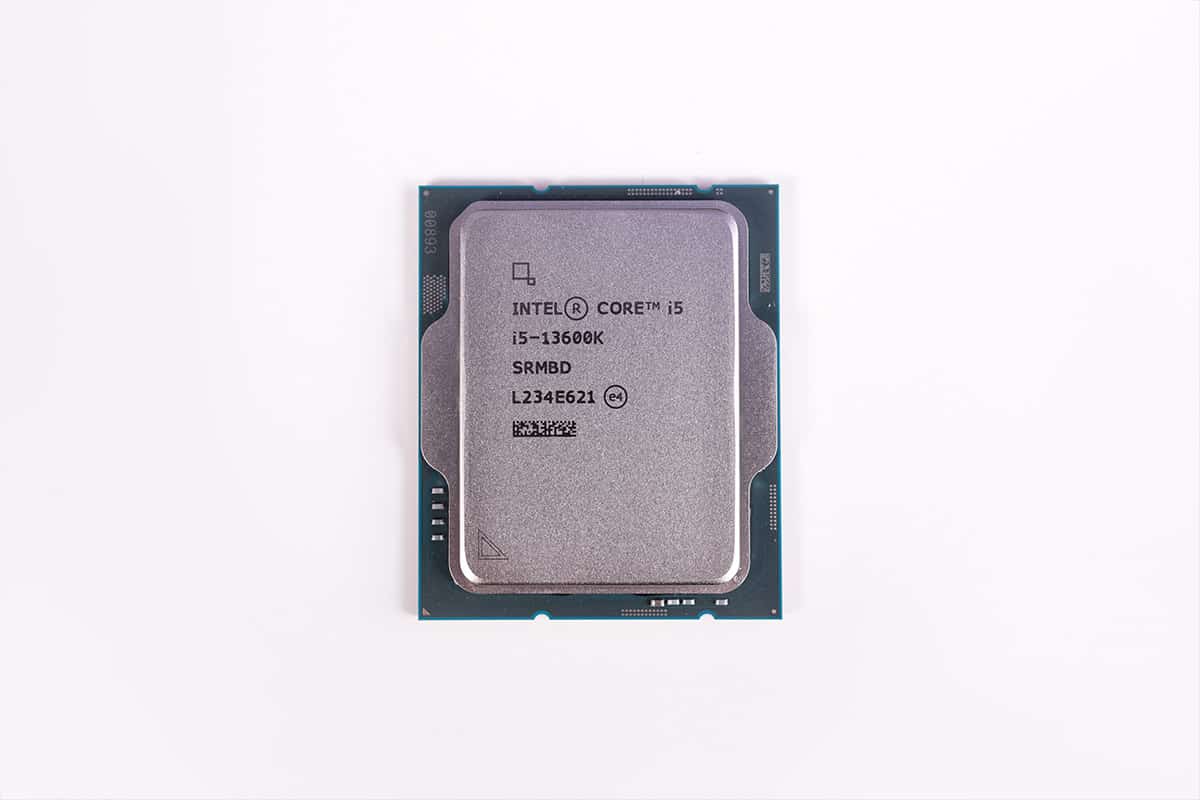
In fact, the performance is similar to the 7700X. Which costs around $400, the fact that Intel has released three SKUs and Ryzen has released four means that there will be some overlap between the two teams as they struggle for dominance over this industry.
But we here at WePC agree that the 13600K is very fairly priced, and would be a great option.
Intel Core i5-13600K pros and cons
The Intel i5-13600K is a very power-efficient CPU, especially due to it being a 14-core, 20-thread CPU clocked over 5GHz. It gets nowhere near as hot as its 13900K bigger brother.

Intel Core i5-13600K

Cores
14
Threads
20
Base speed
P-cores 3.5 GHz / E-cores 2.6 GHz
Boost speed
P-cores 5.1 GHz / E-cores 3.9 GHz
Cache
20MB
TDP
125 W / 181 W boost.
- High core count for an entry level CPU
- High base and boost speeds
- Efficient
- backwards compatible with 12th gen motherboards
- Runs very warm
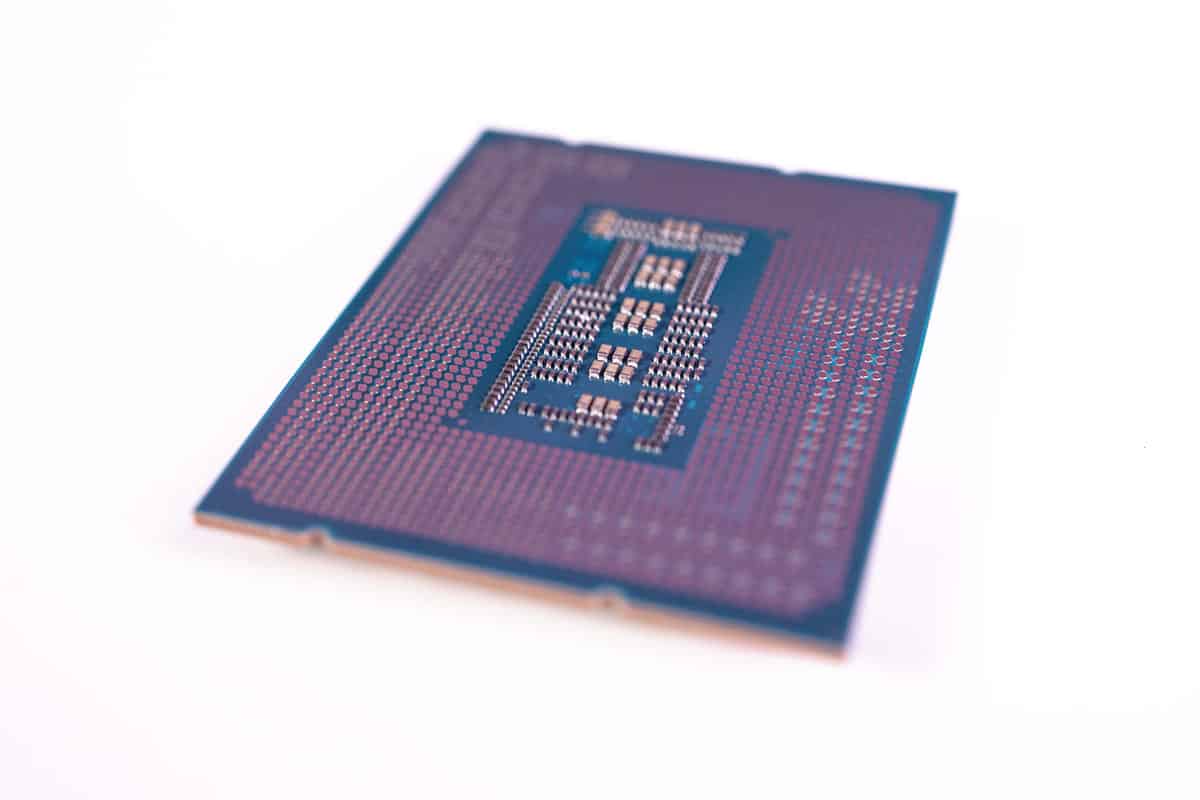
Due to the fact that the whole 13th-generation line-up belongs to the same socket as Alder Lake, you can just whack a 13th-generation CPU into your old 600 series motherboard without a worry. We don’t know whether or not you’ll have to perform a BIOS update, but we know that it’s a small price to pay, compared to buying a whole new motherboard.
The 13900K is incredibly cost-effective, costing between the 7600X and the 7700X on team red’s side, but pretty well outperforming the former and just getting the latter, Intel is seriously a force to be reckoned with this time around.
Final Word

Intel Core i5-13600K
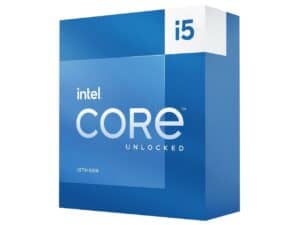
The 13600K is perfect for average gamers looking to upgrade their CPU without breaking the bank, and it has a full 20 threads to back it up when you want to do some multi-core-based workloads. This is a special balance that not many other CPUs have, they weather aim for one or the other. The 13600K is very much a jack-of-all-trades.
If you already have a 600 series motherboard from the last generation and some DDR5 RAM, then you’re already halfway there. You’ll just be missing out on some benefits the 700 series motherboards bring. But that’s a review for another day.


